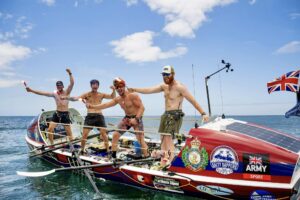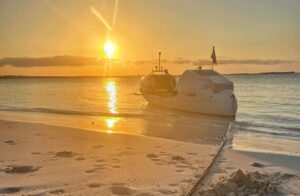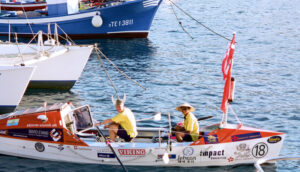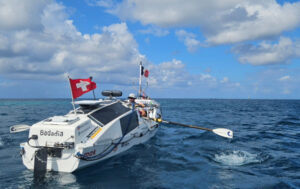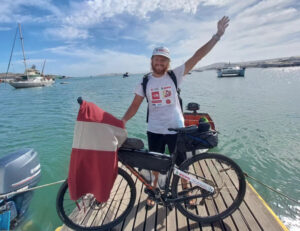Since our last rowing roundup, teams in the Talisker Whisky Atlantic Challenge have been making their way across the Atlantic, and the leaders are just days away from the finish line. Elsewhere in the Atlantic, a second race has started.
Besides the races, four soloists make their way across the Pacific, Antarctic, and Atlantic Oceans.
Pacific Ocean
Michelle’s Pacific Row
Michelle Lee is solo rowing from Ensenada, Mexico to Sydney, Australia. After 155 days at sea, she has covered three-quarters of the 14,000km distance.
At the start of December, storms forced her to hunker down for days. On December 16, Lee was in her cabin and heard a crash on the deck in the middle of the night. She put on her head lamp and went outside. There was a shark on deck, thrashing around. She wasn’t able to put it back in the water. She had to roll it overboard after it died.
Since then, the updates on her tracker have been less frequent. She described how Christmas Day “came and went like every other day on board. I am focused on getting home.”
Of the few updates she has posted, finishing the trip has been a theme. On New Year’s Day, she reached a significant milestone: 2,000 nautical miles (3,700km) to go.

Photo: www.tomrobinsonboats.com
Tom’s Pacific Row
Tom Robinson is rowing from Lima, Peru to his home country of Australia. On December 10, after 160 days at sea, he had covered 9,260km and landed in Penrhyn, an atoll in the northern Cook Islands.
“For over five months, I lived wholeheartedly, passionately, brutally, and in solitude,” he said. “Every day at sea was endlessly interesting, fascinating, and challenging.”
The hardest sections have been the bad weather periods and the continuously changing current. He wrote, “Aiming for one speck [of land] in the Pacific, I was constantly correcting my course to overcome adverse currents. There were only a handful of days when I was actually rowing in the same direction as my destination.”
He will remain on the island for the next few months until the cyclone season ends in April. Then he will row the rest of the way to Australia in stages, from Penrhyn to Samoa and then to Fiji. His final stop before Australia will be New Caledonia.
Atlantic Ocean
Talisker Whisky Atlantic Challenge
The Talisker Whisky Atlantic Challenge began in 1997 and touts itself as both “the premier event in ocean rowing” and “the world’s toughest row”.
On December 12, 43 teams with a total of 127 rowers set off. Soloists, pairs, trios, and quads are battling their way across the 4,800km between Tenerife and Antigua.

Image: https://www.taliskerwhiskyatlanticchallenge.com/
The current race stats are:
Leading overall: Ocean Cats (4,796km)
Leading five: Row Hard or Go Home (4,596km)
Leading four: Ocean Cats (4,796km)
Leading trio: Dark Trio (4,448km)
Leading pair: Dream Boats (3,900km)
Leading soloist: The Atlantic Grappler (3,505km)
Estimates suggest that Ocean Cats will reach Antigua on January 13, after 31 days at sea. The second fastest team, This Way Up, also a foursome, are on track to finish 24 hours later.

Ocean Cats. Photo: Atlantic Campaigns/Facebook
Despite their best attempts, the Ocean Cats will not break the course record. A UK team known as The Four Oarsmen set the TWAC record in 2018. It took them 29 days, 14 hours, and 34 minutes. The winners of last year’s race, Swiss Raw, finished in 34 days, 23 hours and 42 minutes. The four-man team from Switzerland was the first winner from an inland country.
Atlantic Dash Challenge
The Atlantic Dash is the second race taking place in the Atlantic Ocean at the moment. A much smaller race than the TWAC, teams have to row from the Canary Islands to Antigua. Monkey First Adventures, whose teams have rowed five oceans, organized the race to encourage groups and soloists to cross a variety of oceans and seas. Two teams are in the race.

Cabbies do Atlantic Row. Photo: C-Map Atlantic Dash/Facebook
They began on January 3. The first team, Atlantic Dragons, is the British pair of Adrian Tyrrell and Dan Bohin. They have covered 998km and are slightly ahead of the second team, called Cabbies Do Atlantic Row. This trio of three London cab drivers, Robert Barber, Darren Parr, and Stuart Lockhart, have covered 955km.

Atlantic Dragons. Photo: Atlantic Dragons/Facebook
Aurimas Valujavicius: The young Lithuanian started rowing from Spain to Miami on December 26. So far, has covered 570km.
On the first day, he rowed for 16 hours and covered 46km, to get away from the coast as quickly as possible. He hopes that once he makes it fully past the Canaries, he will be able to up his distance to 75km a day. At first, he struggled with seasickness and was unable to keep down much food.
Though the ailment has now subsided, he has spent days on the para anchor. Winds have been blowing him in the wrong direction, and he has been struggling not to lose mileage.

Photo:@aurimas.keliautojas/Instagram
Antarctic Ocean
Antonio De La Rosa: Antonio de la Rosa of Spain started rowing 1,000km across the Drake Passage to Antarctica on January 7. The Drake Passage is one of the roughest bodies of water on Earth. What makes this even more impressive is that this is just the first phase of his challenge. Once he makes it to the Antarctic Peninsula, he will erect a small sail and travel a further 2,000km to Elephant Island and then South Georgia Island, as Shackleton did. He will then cover the final 50km across the island on foot.
He set off, hoping to catch a 72-hour window of good weather that was forecast. Unfortunately, the forecast was wrong. He had just a few hours of favorable wind within the first 100 hours. De la Rosa has almost capsized twice and endured gusts of up to 40 knots. Yet after four days on the water, he insists that he is “happy and moving forward.”

